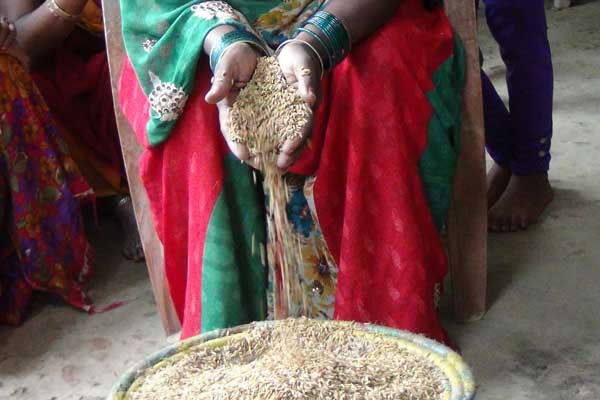
(Photo: Lanie Reyes)
Shortly before this issue of Rice Today went to press, the agricultural world celebrated, on 25 March, the 100th birth anniversary of Norman Borlaug, the legendary scientist and 1970 Nobel Peace Prize winner. He developed the high-yielding semidwarf wheat varieties that jump-started the Green Revolution for that crop starting in South Asia in the 1960s. It was my honor to work with Norm during the late ‘80s and early ‘90s when I was a communicator at the International Maize and Wheat Improvement Center (CIMMYT) in Mexico.
This great man is a hero to all of us who had the privilege of knowing him. One of those people, Robert Zeigler, director general of the International Rice Research Institute (IRRI), points out that Dr. Borlaug saw the Green Revolution in Asia and elsewhere as a means to buy us all time to stabilize populations and generate the knowledge that would allow us to support ourselves worldwide without destroying the environment. Now, Dr. Zeigler frets that too many anti-technology zealots who claim to defend the environment and the interests of the poor are causing a major distraction to making progress by attacking the achievements of Borlaug and his contemporaries. Read Dr. Zeigler’s frank analysis, Bitter harvest from a noble cause.
As Rice Today continues to emphasize the importance of women in agriculture, our cover story features Prabhawati Devi, a strong-spirited farmer in India’s eastern Uttar Pradesh who is creating her own oasis in a droughty landscape. Moving to Senegal, the county’s mother of modern rice farming, Peinda Cissé, tells an inspiring story in her own words. And, no one has been more involved in blazing the trail of empowerment for women than IRRI’s own Thelma Paris, who is retiring after 40 years as a gender specialist at the Institute. Her achievements and contributions are simply phenomenal.
Congratulations to the researchers in the Stress-Tolerant Rice for Africa and South Asia (STRASA) project, which has been given the go-ahead for a third phase. It is STRASA technology that is empowering women farmers such as Prabhawati Devi, whom I mentioned above. Later in April, I look forward to traveling with STRASA coordinator Manzoor Dar to West Bengal in eastern India to see first-hand how this project is transforming the lives of the poor farmers of the region. Stay tuned for my report in a future issue. On STRASA’s African front, see Climate smart rice for Africa, which chronicles the project’s impressive impact to date in 18 countries across the sub-Saharan part of the continent.
Also from India, we have the latest on the groundbreaking National Food Security Act and then add a rice folk tale from Nagaland in the northeast and a birthday bash for rice itself in Kerala on the southwestern tip of this culturally rich country.
For lovers of gastronomy and cartography, we turn to Bangladesh. Check out What’s cooking—it’s Bhuna khichuri, a highly nutritious dish featuring rice and protein-rich pulses. Then see how IRRI and the Ganges Basin Development Challenge Program of the CGIAR Challenge Program for Water and Food are mapping regions of opportunity and high potential in the coastal areas.
Moving to another part of Asia, Bruce Tolentino, IRRI’s deputy director general for communication and partnerships, points out that the 10 member countries of the Association of Southeast Asian Nations (ASEAN) are crucial to global food security and how the Global Rice Science Partnership (GRiSP) can help the region attain its rice productivity and quality goals. Read his analysis.
In Latin America, read about how the region’s rice varieties must first survive a baptism of fire at Colombia’s remote Santa Rosa Experiment Station before becoming worthy of being planted in farmers’ fields.
In a major transition at IRRI, Achim Dobermann, the Institute’s deputy director general for research since 2008, departed in February, leaving behind a remarkable legacy of achievement. He truly put rice research on the global agenda. Read all about his time at IRRI. Replacing him at the helm of IRRI’s innovative research program is Matthew Morell, who has led research at Australia’s Commonwealth Scientific and Industrial Research Organisation (CSIRO) for the past 16 years (see IRRI welcomes new head of research).
And, welcome aboard to two new Rice Today editorial board members, Matthew Morell, who replaces Achim Dobermann, and Eduardo Graterol, the new executive director of the Latin American Fund for Irrigated Rice (FLAR).
Happy reading!
Gene Hettel
Rice Today editor-in-chief







